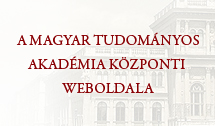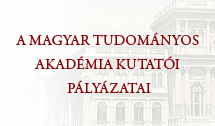The Resarch Group for the History and Philosophy of Science, RCH HAS, cordially invites you to the upcoming talk of its seminar series:
Dr. Magdalena Malecka (University of Helsinki & CEU IAS):
"Economic Imperialism: Epistemic Advancement, Abuse of Power - Neither, Both, or More"
Date of the event: 17th April 2018., 17:00
Venue of the event: 4. Tóth Kálmán st., Budapest, 1097; 7th floor
Absztrakt:
‘So economics is an imperial science’ said proudly George Stigler – a key leader of the Chicago School of Economics. Economics’ fierce critics also call economics imperialistic – for them it is a serious accusation. But does it make sense at all – to use the metaphor of imperialism in order to account for scientific practices and relationships between scientific disciplines? I believe, it does.
My paper contributes to the debate on scientific imperialism and on economics imperialism. I propose the account of scientific imperialism (a modified and improved version of the idea published in Małecka, Lepenies 2018) and I show how it advances the recent discussion on economics imperialism.
The philosophy of science debate on scientific imperialism has revolved around the question of the permissibility of the application of scientific theories and methods outside the discipline in which they were initially introduced. My proposal builds upon Uskali Mäki’s notion of the imperialism of standing, as well as it accommodates the intuitions of some participants in the discussion that there is something normatively problematic about scientific imperialism. In my view, scientific imperialism is an activity that is related both to a certain view on the superiority of the expanding approach that is endorsed by its proponents (the epistemic aspect of my account), as well as to a power to affect standing of scientific approaches– the expanding approach is institutionally favoured and it gets higher standing in academic and non-academic contexts (the institutional aspect of my account)
I bring the account of scientific imperialism to analyse economics imperialism. In the debate on economics imperialism the different sides emphasize only certain aspects of an imperialistic scientific practice. The proponents of expansion of economics, ‘imperializers’, stress only the epistemic aspects of applying economics outside its domain. They claim that their approach is superior and progressive, as, for example, it enables unification. The critics mostly point out the abuse of the institutional power by economics expanding to other fields. Both aspects should be evaluated, however. Furthermore, it is important to understand, that even if we were able to see the epistemic advancement of applying a certain economic approach to the topics studied already within other research programmes, this wouldn’t make economics imperialism justified. The reason why we treat some applications of economic approaches as imperialistic is that their proponents violate the norms of scientific community that, according to Helen Longino, are conditions for objectivity in science.


